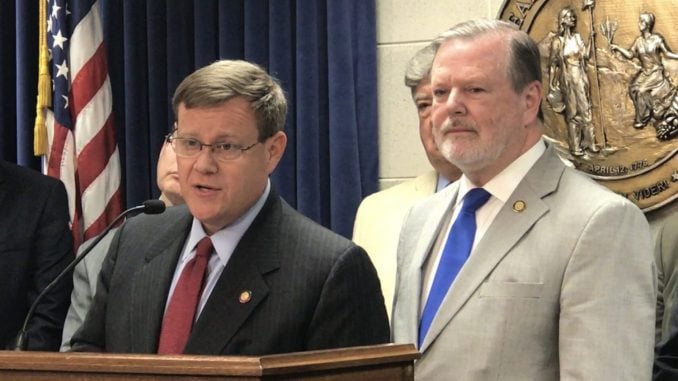
RALEIGH — The state has surpassed 400 cases of COVID-19. Gov. Roy Cooper has enacted executive orders shuttering businesses and the 10 million citizens of North Carolina are living through stormy times.
As expected, the closure of museums, salons, spas, gyms and other businesses has unemployment claims soaring beyond 113,000 in a single week. The norm for those jobless claim filings is 3,000 a week. Officials with the Employment Security Commission said that approximately 87% of last week’s claims were COVID-19 related.
While Cooper and the Coronavirus Task Force work to “flatten the curve” of the virus’ spread, the General Assembly’s budget strategies that built up the state’s rainy-day fund will be put to the test as North Carolina’s economy is impacted by the state and federal governments’ response to the coronavirus pandemic.
Just how prepared is the state financially?
“North Carolina has $3.9 billion in its unemployment reserves, $1.1 billion in savings, a $74 million disaster relief fund, $184 million in Medicaid contingency reserves and a $2.2 billion balance of unappropriated cash-on-hand,” said House Speaker Tim Moore (R-King’s Mountain) in a recent press release.
As of February, North Carolina’s Savings Reserve Fund, often referred to as the “rainy-day fund,” has nearly $1.2 billion; but it wasn’t always so flush.
Two years prior to Republicans winning majorities in the House and Senate in 2010, the fund had a balance of around $97 million. In 2011, there was a mere $4 million left.
While campaigning for governor in 2016, Cooper attacked former Gov. Pat McCrory and legislative Republicans for “building up the rainy-day fund in excess of what’s necessary for the state.” That same year Democratic Rep. Larry Hall, now Cooper’s Secretary of Military and Veteran Affairs, complained about not spending the funds and by adding to the rainy day fund the state had “artificially starved ourselves.”
Another top Democrat, Attorney General Josh Stein, also voted against adding money to the rainy-day fund via the 2015 appropriations bill while serving in the state Senate. Those funds have been made available for hurricane victims across eastern North Carolina.
Cooper, Hall, Stein, and other Democrats now find that the means are available to help save the state from economic collapse. The prudent savings measures of the General Assembly will help — but so will federal aid packages, the announced extension of tax filing and payment, and the Trump administration’s cutting through the red tape to help small businesses. North Carolina has already been approved for disaster loans and grants from the U.S. Small Business Administration.
In 2017, Pew Charitable Trusts said North Carolina’s rainy-day fund met the four best practices and made the state a national leader in managing volatility and reserve fund policy. Those four practices were creating a savings deposit rule tied to revenue growth, defining clear and objective conditions for fund use, establishing an evidence-based fund savings target, and providing a mechanism to re-evaluate the rules governing the fund.
“We’ve built a multibillion-dollar cash surplus and one of the healthiest unemployment insurance reserves in the country,” wrote Sens. Ralph Hise (R-Mitchell) and Ted Alexander (R-Cleveland) in a recent article. “We have the means for a proportionate response to an economic disruption. Times like this are exactly why.”


